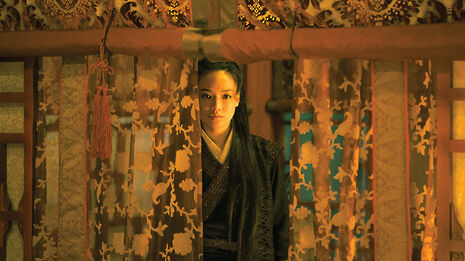Film: The Assassin
A film of ‘political intrigue’ and ‘luscious’ colours

The Assassin is a strange film, and one which I am still trying to figure out, a week after seeing it. Set in 8th-century Tang dynasty China, it tells the story of Yinniang, a trainee-assassin sent on a mission to kill Lord Tian, the most powerful military leader in the dissident Weibo province, to whom she was betrothed as a child. It’s a well-known tale in China, I gather, loosely adapted from a story by the scribe Pei Xing, whose work is among the most important sources we have from and about the Tang dynasty.
If you’ve seen the trailer, you are probably imagining a very different film. The trailer seems to have compiled every action sequence from the film, and implied that it is a story of the choice between love and duty. It’s very misleading. Rather, it’s about personal agency in the midst of political intrigue and unrest, and it doesn’t revel in its action sequences as do more typical wuxia ventures (period martial arts films, often quite fantastical) like Crouching Tiger, Hidden Dragon. The action sequences are present when necessary, but they are as few and far between as director Hsiao-Hsien Hou can get away with in a film about a killer.
The Assassin is one of the most visually arresting films I’ve seen in a while. Interiors and exteriors alike are rich and sumptuous. In fact, when Hsiao-Hsien first saw the filming locations, he reportedly compared them to a classical Chinese painting. That’s certainly the impression you get. The palette of colours is luscious and the depth in every shot is stunning. Hwarng Wern-Ying’s costumes are a dazzling display of silks and brocades, and Lin Giong’s score is a delicate balance of simple yet ominous drumbeats and eery zithers, and tense, menacing silences.
Qi Shu in the title role is steely and detached, and one of the most remarkable aspects of the film is its handling of her character. Her mission to kill Lord Tian is essentially a punishment for her prior failure to assassinate another political figure, on finding him with his sleeping son in his arms. However, the film does not turn her into a soft-hearted woman trapped in a life of killing – rather she is a skilled assassin with the potential to show mercy, but it’s never predictable whether she will make the choice to kill or spare. Unlike the trailer implies, there’s no romance angle for her character, and the fact that she is a woman is purely incidental to the story, which is unusual in period films. Crucially, she emerges from the film as a powerful figure who has taken control of her life and who isn’t a plaything for those in power.
The film has been very divisive, and I found myself somewhere between the two camps of those either extolling the entire production, or decrying it as unbelievably tedious. While beautiful, I found the slow pace a little grating at times, and my difficulty in understanding the plot certainly took away from my engagement with it. Hsiao-Hsien’s story-telling explains the history rather impressionistically, giving us allusions and throw-away mentions where we might prefer actual detail. I do wonder how much the Western audience’s unfamiliarity with this period of history has led to its lukewarm reception. Nevertheless, we are rarely treated to cinema as ravishing as this, and for that alone I’m still baffled that the film wasn’t at least nominated for an Oscar.
Unfortunately, The Assassin has had very limited distribution. I caught the last showing in Cambridge, and it doesn’t appear to be making a comeback soon, which is a shame. It’s a film which benefits immensely from being viewed in the cinema, and if you’re lucky enough to find another showing, I urge you to try and see it. It’s worth it for sheer visual splendour alone.
 News / SU reluctantly registers controversial women’s soc18 December 2025
News / SU reluctantly registers controversial women’s soc18 December 2025 Features / Should I stay or should I go? Cambridge students and alumni reflect on how their memories stay with them15 December 2025
Features / Should I stay or should I go? Cambridge students and alumni reflect on how their memories stay with them15 December 2025 News / Dons warn PM about Vet School closure16 December 2025
News / Dons warn PM about Vet School closure16 December 2025 News / Cambridge study finds students learn better with notes than AI13 December 2025
News / Cambridge study finds students learn better with notes than AI13 December 2025 Fashion / The art of the formal outfit 18 December 2025
Fashion / The art of the formal outfit 18 December 2025








